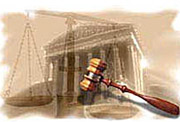| The hopes of Enron investors are riding on a Supreme Court case that may be the last chance at compensation for their losses when the scandal-ridden energy company collapsed. Much of corporate America has jumped into the court fight, arguing that shareholders in companies that commit securities fraud should not be allowed to sue banks, accountants, law firms and suppliers that allegedly participated in the fraud. Allowing investors to file class-action lawsuits in such cases would "threaten the safety and soundness of individual financial institutions and the nation's banking system," a coalition of business groups, including the American Bankers Association, said in court papers. Firms and corporations that enabled companies such as Enron to defraud stockholders should now have to pay, lawyers for the investors say. "The banks orchestrated the fraud; they weren't sideline viewers," said Patrick Coughlin, the lead lawyer for Enron shareholders. "So when the question comes up about who should be on the hook for Enron, it's the banks." Meir Feder, a New York lawyer who defends companies in securities cases, said "everybody understands that the Enron shareholders are victims here, but there's a reason that Congress and the Supreme Court haven't allowed people to sue third parties." He added, "In the real world, for every third party who actually had a role in a fraud, you're going to get lots of suits against other third parties who really didn't." When the Supreme Court hears arguments on the issue Tuesday, Enron investors will be on the sidelines. The court is dealing with a suit by Stoneridge Investment Partners against Motorola Inc. and Scientific-Atlanta Inc., which Cisco Systems Inc. now owns. Only eight of the nine justices will participate. Justice Stephen Breyer has withdrawn from the case; he gave no reason, but financial disclosure documents state he owned Cisco stock. Chief Justice John Roberts, who did not participate in the court's decision to take the suit, has come back into it. The Stoneridge case has strong parallels to the one pursued by Enron shareholders, which the high court has left alone. The Enron suit was up for consideration June 21 at one of the justices' regularly scheduled private conferences, but the court has neither accepted nor rejected it. "It's easier to decide a legal issue in a noncharged atmosphere, which may have been what the justices had in mind by not taking on Enron," Coughlin said. Stoneridge accused Motorola and Scientific-Atlanta of engaging in sham transactions with a cable television company, Charter Communications Inc. The alleged motive was to inflate Charter's revenue by $17 million, help meet Wall Street expectations and avoid a drop in the company's stock price. Because of a number of deals including the ones involving Motorola and Scientific-Atlanta, Charter eventually restated its financial statements, reducing revenue by $292 million from 2000-2002. In addition, four former Charter executives pleaded guilty in the matter after the Justice Department investigated the deals. Stoneridge's efforts to recoup investment losses from Motorola and Scientific-Atlanta were turned back by lower courts, which said that the allegations were nothing more than claims that the two companies aided and abetted the fraud by Charter. Neither Motorola nor Scientific-Atlanta was alleged to have engaged in any deceptive act, the courts said. Enron investors got a similar ruling from the 5th U.S. Circuit Court of Appeals, which found that Enron had a duty to disclose financial problems to shareholders, but the company's banks did not. In both cases, the issue comes down to the meaning of the word "deceptive" in federal securities law. At stake in the Enron case is more than $30 billion sought by hundreds of thousands of investors from banks that allegedly helped the company, once the nation's seventh-largest, hide billions in debt and make failing ventures appear profitable. The Enron case and the Stoneridge investors' suit are the latest chapter in the struggle between plaintiffs attorneys and the business world over class-action suits. When lawyers who file such suits persuade a court to certify a large class of plaintiffs, companies almost always settle rather than risk going to trial. A 2002 study for the conservative Federalist Society found that three of every four federal securities fraud cases were settled, with the remainder thrown out of court. Since 2000, investors filing federal class-action suits alleging securities fraud have settled for $42 billion, according to the Stanford Law School Securities Class Action Clearinghouse. So far, some banks have settled with Enron investors: Citibank for $2 billion; J.P. Morgan Chase for $2.2 billion; Canadian Imperial Bank of Commerce for $2.4 billion. Others are still fighting: Merrill Lynch & Co. Inc.; Credit Suisse First Boston; Barclays Bank PLC; Pershing LLC, now a subsidiary of Bank of New York Mellon Corp. For investors, recent developments have gone against them. The Securities and Exchange Commission voted to intervene in the Stoneridge case on the side of investors. But the Justice Department solicitor general, after pitches from President Bush and Treasury Secretary Henry Paulson, rejected the SEC's recommendation and filed a brief on the side of Motorola and Scientific-Atlanta. |





